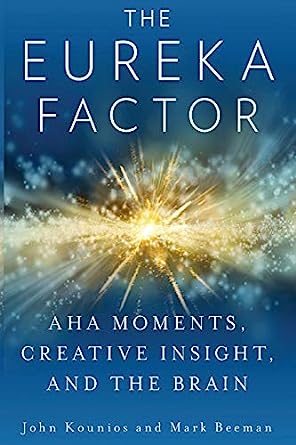Eureka!
I have recently finished reading The Eureka Factor: Aha Moments, Creative Insight, and the Brain by John Kounios and Mark Beeman. As the name suggests, the book is about the brain and how insights (Eureka moments) are generated.
It is written by two Psychology researchers who have spent many years researching neuroscience and studying how these “A-HA” moments are generated. Although the book is written by academics it is very approachable and wrote in an easy to follow and straight forward way without getting bogged down in the details or too much jargon. The book discusses several studies and experiments performed to understand the brain and these are presented in an entertaining way providing food for thought and making it easier to relate to the outcomes and conclusions of the book.
Summary of my key takeaways from the book:
- If you’re a ‘morning person’ you’ll be more analytical in the morning and more creative in the evening.
- Vice versa also applies.
- This is related to inhibitions and which part of your brain is being used. When inhibitions are lower your brain is more free to have creative thoughts and make connections.
- Insightfulness can be subsituted with analytical thinking:
- Remove assumptions and “the box” to purposefully think outside it.
- This is limited to knowing there’s a specific problem to be solved (and the constraints) and won’t be spontaneous like a ‘true’ insight.
- The environment can help induce more creative & insightful thinking:
- Rounded, soft edges
- Dim light
- Blue & green colours
- Open, airy, calm
- Different & change of surroundings every so often
- Don’t be predictable
- Hang around unusual people
- Take in as much of the facts & analytical information as you can and then take a break and do something else. This can help induce insightful moments as your brain creates connections to find a solution.
- Broaden your horizon:
- Thinking about long-term goals can help with insightful thinking.
- If you were told you were going on a holiday tomorrow then you would be thinking about what you need to pack, what time you need to leave your house to get to the airport, how you will get to the airport etc.
- If you were told you’re going on a holiday next year you would be thinking about the culture, language, food, things to do and bigger picture items.
- Additive scenario (you have an umbrella) - broadens attention.
- Reductive scenario (it’s not raining) - narrows horizon.
- Feeling happy will make insights easier/more likely.
- Love broadens thinking whilst lust narrows it.
- Avoid Time & Financial pressure as neither help with creativity.
- Thinking about long-term goals can help with insightful thinking.
These are my very brief notes on the book and the book goes into much more detail walking through the studies used to find these outcomes. Overall it was an interesting read that I’d recommend to anyone who thinks the above sounds interesting.
